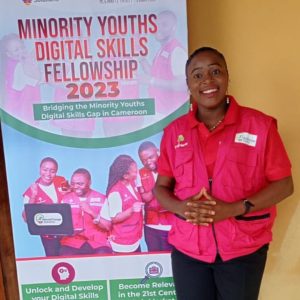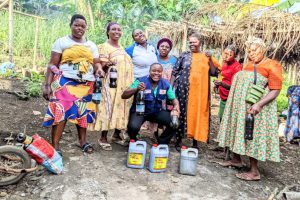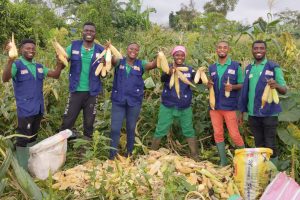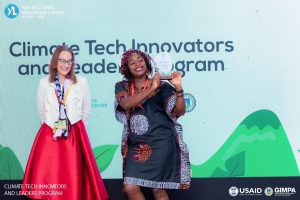 Ghana: Farida Bedwei, an engineer working for digital inclusion
Ghana: Farida Bedwei, an engineer working for digital inclusion
 Alvine Kamaha, the Cameroonian physicist with an inspiring career path
Alvine Kamaha, the Cameroonian physicist with an inspiring career path
 Ethiopia : Maheder Haileselassie Tadese, photographer of the human condition
Ethiopia : Maheder Haileselassie Tadese, photographer of the human condition
 Inemesit Dike: “My work revolves around navigating the intersection of law, innovation, and technology”
Inemesit Dike: “My work revolves around navigating the intersection of law, innovation, and technology”


In Cameroon, Felicia Nja-Njobaya Motia encourages eco-friendly farming practices among peasant farmers. By 2025, the cofounder of Nkwa4change solutions and Yali alumna hopes to empower 10 000 peasant farmers to embrace and practice what she refers as « regenerative agriculture » in order to mitigate and build strong resilience to climate change.
Felicia envisions the present and the future primarily through the lens of farming, « an activity that will never fail », she confides. Growing up in South-western Cameroon, farming was the main subsistence of her family, she recalls. After losing her parents as a teenage, the young Cameroonian started practicing farming herself to cater for her needs and pay for her school fees. She then became aware of the challenges peasant farmers faced to produce crops due to climate change. With a background in geography and planning, she began researching on climate change and found out organic farming, a solution allowing her to grow crops while preserving environment. After applying it, it did not take her long to see positive results.This experience led her to commit to promoting organic farming among peasant farmers to help them adapt to climate change and boost their production.
Transforming farmers’ lives through Nkwa4change solutions
Committed to transform farmers’ lives, Felicia would realise her dream thanks to an encounter during a workshop with Nkembeteck Henry Nkwa, the founder of Nkwa4change Solutions, a community leader, who would later become her mentor, but also with whom she would co-found the organisation “Nkwa4change solutions” in 2016. “As we related our stories, we discovered that we both originated from Rural communities in Cameroon’s Southwestern region, had large families. I was the last and only girl in a family with nine surviving children out of fifteen born. I had to battle and return to the soil to provide for myself. He was the only member of a family of 19 surviving children to have studied and earned a master’s degree. Having similar stories, we wanted to bring about change in our communities and decided to legalize the organization,” she tells Africa Women Experts.
In 2016, the organisation got a funding from the Pollination project to empower minority youth who were unable to attend university, to bring about change in their communities. In 2018, the organisation launched another project, this time aimed at young women and endowing them with tools to boost their productivity in agriculture, in order to become change agents in their communities. Since 2023, the organisation has been implementing two projects, the “regenerative agriculture project” led by Felicia and the “restoration and preservation of the mangrove” project, which aims to preserve the mangrove along Cameroon’s coastline through awareness-raising, education and practical actions.
Empowering farmer peasants on regenerative agriculture
 .
. 
As coordinator of the Regenerative Agriculture Hub project, Felicia works mainly in Fako (Buea) with vulnerable Internally Displaced Persons (IDPs), mostly women from the South-western area of Cameroon which has faced troubles, insecurity over the past years, leading to massive population displacements. “These are people who, because of the Anglophone crisis, have left rural areas and suburbs and found themselves in Buea. Some of them don’t even know where their children are. Most of them don’t have the skills to work in an office. They depend solely on the land,” she explains.
To empower peasants, she has put together a group of young academics studying agriculture and who volunteer to share their expertise to the farmers. As part of the project, she has established a regenerative agriculture farm, a 400-square-meter demonstration farm serving as a research center to exhibit regenerative agriculture best practices and where peasants are invited to come and learn, but are also trained to produce organic liquid fertilizer. «When the peasants come, they are always marveled by the quality of the crops and the harvest. And we always tell them that farming is not witchcraft. It is a passion », she says. All the harvests are then stored in the project’s demonstration hub where the organisation displays organic products such as maize.
To date, the young Cameroonian has empowered over 400 vulnerable IDP to practice regenerative agriculture, improving their harvests by over 50%. Moreover, the regenerative agriculture hub project has joined the consortium « 4 per 1000 », a global initiative that seeks to prove how agricultural soils can play a crucial role in food security and climate change.
She also works as assistant project analysis for the sustainable agriculture department of Caritas, the charitable arm of the catholic church, in the diocese of Buea in Cameroon.
Yali Africa Climate Tech innovator

Thanks to her work on regenerative agriculture, she took part in the 1st cohort of the Yali Africa Climate Tech innovators and leaders program in Ghana in 2023, targeting young African leaders, after missing out a Yali opportunity in 2018 due to a lack of passport. “In life, you can’t start once and expect to succeed. You fall, you get up again. But you have to keep moving forward,” she explains.
After an intensive three-week program in Ghana, she was rewarded as Climate Tech star. She also received the « Humanitarian vision award » from Youth Vision organisation in Cameroon. In 2023, she participated as well in an executive training at Ban Ki-moon Center for Global Citizens on young women’s leadership in climate adaptation.
Today, Felicia Motia speaks proudly about her career in agriculture, a choice she made despite being mocked by her university mates. “I call myself the grandmother of total confidence. When I started farming, my classmates would say to me: you have a degree, why did you decide to rub your hands on the land? Can’t you go and work in an office? Can’t you teach? But I said that the earth can’t fail and I don’t want to answer yes /no sir or Madam to anyone. I always tell myself that I’ll be the last person to reject my own idea », she confides.
Today, the young leader seeks to empower 10,000 farmers by 2025 and create 10 regenerative agriculture farms and centres in each region of Cameroon to promote innovative, climate-smart farming practices. She is committed to forging partnerships to extend her work on the best practices in regenerative agriculture.
Danielle France Engolo